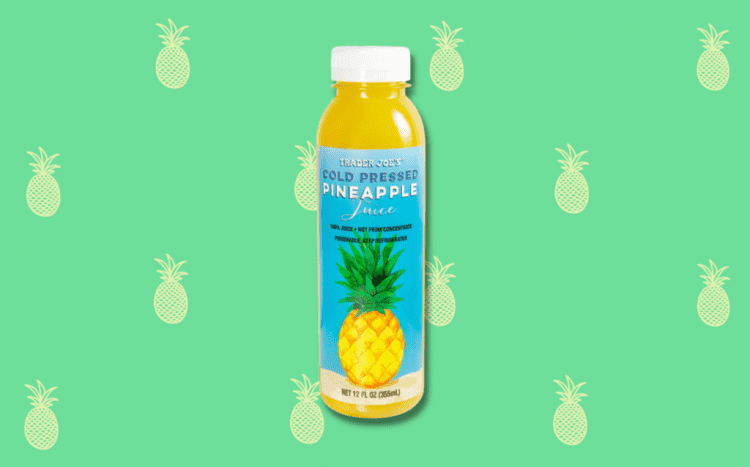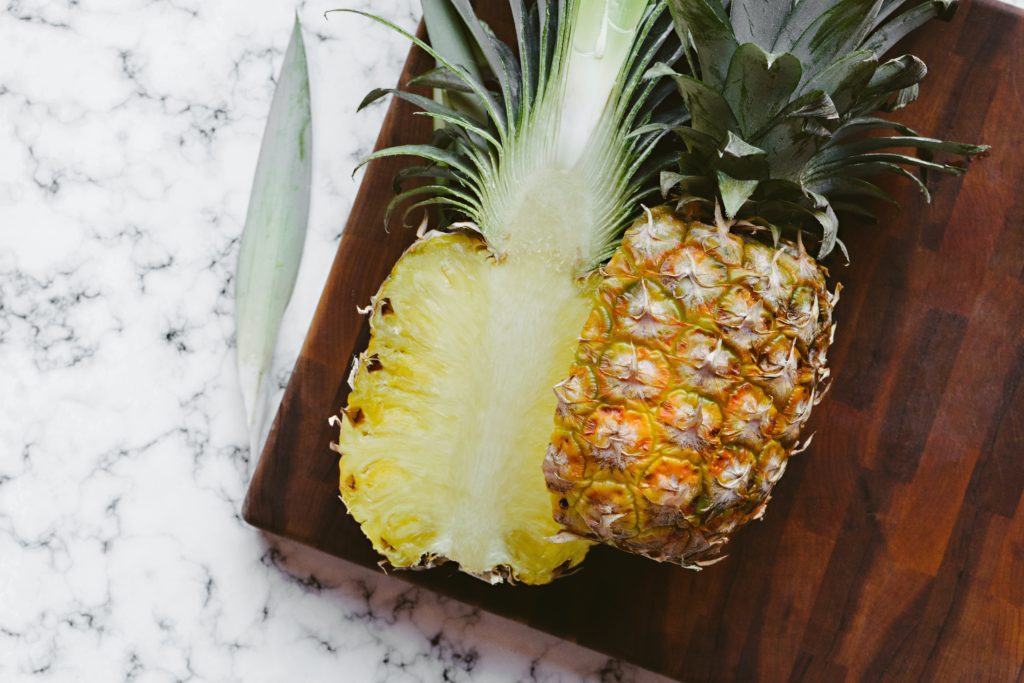Doctors Are Prescribing Trader Joe’s Pineapple Juice as a Cold and Flu Remedy
When someone told us that their kid’s pediatrician recommended Trader Joe’s Cold Pressed Pineapple Juice to help fight off the cold and flu, we were intrigued.
As a mom of two young daughters, I wanted to know what was up with so-called magical pineapple juice.
Coming off the pandemic, it truly feels like my kids always have runny noses. I’ve wondered if plugging my kids with elderberry and vitamin C was enough to fight off the winter-slash-classroom germs.
There’s been so much hype around elderberry syrup being a major immunity booster for kids and adults alike. But it does taste kind of bitter, and I’m willing to try whatever it takes to boost my kid’s immunity this winter. Should I be grabbing some pineapple juice as a cold and flu remedy instead? Does pineapple really pack a lot of punch?
I consulted with some experts about the medicinal powers of pineapple juice to uncover once and for all—was this pediatrician on to something? Or is this just a random fad that will fade away as fast as those hair-growing gummies influencers used to shill? Let’s dive in.
We love it for the bromelain
“Pineapple has been used as part of traditional folk medicine since ancient times and it continues to be present in various herbal preparations,” says Canada-based Licensed Naturopathic Doctor Yelena Deshko. “One of the main active constituents in pineapple is bromelain, a complex natural mixture of enzymes which possesses notable therapeutic properties.”
Bromelain, explains Dr. Deshko, “has shown a number of promising clinical effects including anti-inflammatory, anti-cancer and antimicrobial activity.”
In other words, pineapple really does pack quite a punch!
Overall, pineapples “are quite a nutritious fruit,” says Dr. Deshko. “In addition to containing bromelain, described above, pineapples are rich in fiber, vitamin C, manganese and copper.”
Antioxidants help boost immunity
“Kids, of course, are generally more prone or susceptible to common cold and general viral infections,” says Dr. Shiven Chaudhry, an integrative medicine specialist based in California and Nevada. “So foods that help with antioxidant support and boost the immune system are really important.”
Since pineapple juice offers a number of nutrients that will help with antioxidant support, “ in turn help in boosting immunity. So, yes, eating pineapples can be beneficial overall because of vitamin C and bromelain.”
Go for the real deal
However—it may be best to opt for the real stuff vs. juice. “I would recommend fresh pineapple consumption over pineapple juice, but for kids who refuse to eat whole pineapple the juice could be a good secondary option,” advises registered dietitian DJ Mazzoni, RD, MS, CDN, CSCS. “Consuming a nutrient-dense diet can help prevent the cold and flu, so pineapple juice may be a good option.”
Thankfully, my little picky eaters do like fresh pineapple. So while I will strongly consider Trader Joe’s Pineapple Juice for their growing bodies, I’ll first opt for the tangible fruit itself as we ease into winter.
Food fighters
Curious about additional ways I could keep my kids cold-free till March (fingers crossed!), I asked Drs. Deshko, Chaudhry, and Mazzoni, about additional immunity-boosting nutrients.
Some essential nutrients for cold and flu season include:
Vitamin C: An essential nutrient that functions as a key antioxidant and has been proven to be effective for boosting immunity. “A 2013 review of clinical trials concluded that regular vitamin C supplementation reduces the duration of common colds,” says Dr. Deshko.
Vitamin D: This vitamin has been the subject of considerable research for its immune boosting effects in the age of the COVID19 pandemic. “A 2021 meta-analysis reported that vitamin-D-deficient individuals had about three times higher chance of getting infected with SARS-CoV-2 and about five times higher probability of developing the severe disease.”
Zinc: “Zinc affects multiple aspects of the immune system and is crucial for normal development and function of many immune cells,” says Dr. Deshko. Recent studies found that micronutrient supplements including zinc, vitamins C and D, may be modestly effective in preventing acute respiratory infections and improving their clinical course by shortening their duration.
Garlic: The benefits of garlic to health have been proclaimed for centuries; “however, only recently has Garlic (Allium sativum) and its derivatives been proposed as a promising candidate for maintaining the balance of the immune system,” points out Dr. Deshko. “Garlic has been found to enhance the functioning of the immune system by stimulating many types of immune cells.”
Shiitake mushrooms: Mushrooms are widely cited for their medicinal qualities. A recent 2015 study found that simply eating shiitake mushrooms daily (between 5-10 grams of dried mushrooms) for 4 weeks significantly increased the immune function of the study participants.
Turmeric: According to Mazzoni, it’s shown in clinical research to have anti-inflammatory and anti-microbial properties. “I recommend cooking with turmeric and black pepper in combination. Black pepper significantly increases the amount of turmeric actually absorbed and utilized by the body.”
A healthy lifestyle is key
Another critical factor for optimal immunity is adequate sleep, stresses Dr. Deshko. (This applies to both kids and adults, of course!) “Short sleep duration and poor sleep quality have been implicated in the susceptibility to infectious illness. Recent studies have confirmed that shorter sleep duration prior to viral exposure, was associated with increased susceptibility to the common cold.”
Dr. Chaudhry recommends limiting processed foods, which he says may cause blood sugar to spike. “This is an environment where infections can thrive in the body. It can increase inflammation which is not good because that depresses your immunity level. In some way, your body is busy fighting against a bad diet instead of protecting you against viruses and bacteria.”
Adds Mazzoni: “Cultivating a healthy immune system through diet, exercise and other lifestyle factors like socialization–a healthy social life is actually associated with improved immune function–is a more logical approach to immunity than germ avoidance in my opinion.”
There are germs everywhere, he explains, “and healthy individuals have an immune system which can fight those germs off.”

Source by www.blogilates.com




